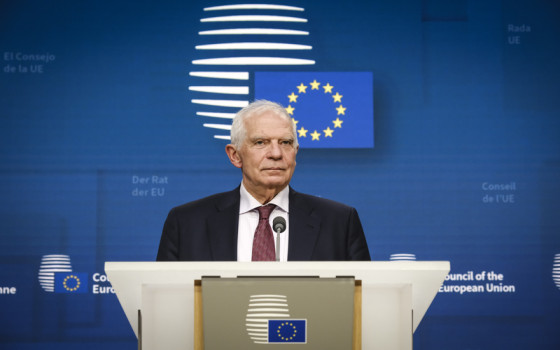
From the European Union to the Arab League: The chances of a two-state solution are receding further... while the international community denounces, condemns, feels regret and finds it difficult to act.

- Europe and Arabs
- Wednesday , 11 September 2024 9:21 AM GMT
Brussels: Europe and the Arabs
The European Union has given its full support to the ongoing efforts by Egypt, Qatar and the United States. But the ceasefire agreement has not yet been signed and does not seem likely to be signed in the near future. This came in a speech by European foreign policy coordinator Josep Borrell before a ministerial meeting of the Arab League in Cairo during his visit to the region that began Monday and includes Egypt and Lebanon. During his speech, Borrell asked why this has not happened. He answered, "Quite simply, because those who are waging war have no interest in ending it. So, they are just pretending. Fewer and fewer pretending. Because, as it turns out, their intransigence is accompanied by complete impunity. If actions have no consequences, if flagrant violations of international law are ignored, if institutions such as the International Criminal Court are threatened, and if the rulings of the International Court of Justice are completely ignored by those who promote a rules-based order, who can be trusted?"
He added, "A year ago, at the UN General Assembly, we were thinking with great good faith about what a 'day of peace' might look like." Less than six months ago, we were seriously talking about “the day after.” Today, the “day after” is receding like a mirage in the desert.
Not only is there no let-up in the war in Gaza. What is looming on the horizon is the extension of the conflict to the West Bank, where extremist members of the Israeli government—the Netanyahu government—are trying to make the establishment of a future Palestinian state impossible.
A new front is being opened with a clear goal: to turn the West Bank into a new Gaza—by escalating violence, delegitimizing the Palestinian Authority and encouraging provocations to respond forcefully, and not evading telling the world that the only way to reach a peaceful settlement is to annex the West Bank and Gaza. Yes, without action, the West Bank will become a new Gaza. And Gaza will become a new West Bank, as settler movements prepare to build new settlements.
Against this backdrop, it is clear that the chances of a two-state solution—which we have been repeating all along—are receding further and further, while the international community denounces, regrets, and condemns, but finds it difficult to act. But there are people who are acting. Yesterday, I visited the Rafah border crossing. I would like to commend the efforts of the many people who are working hard to overcome the many difficulties in order to get long lines of trucks into Gaza, where the besieged civilian population is being deprived of its basic needs – in a very conscious way.
By the way, let me say that our EUBAM [Rafah] is ready to act if the parties agree to let it intervene.
Yours, what can we Europeans and Arabs do? What can we do?
I think we need to reaffirm the basic principles of the settlement. The legal foundations are there and the International Court of Justice has clearly stated them. What is missing is the political will to implement them. We need to raise our voice at the upcoming UN General Assembly; to prevent a kind of “Gaza fatigue” that would encourage the extremists and once again postpone the idea of a political settlement.
We need to launch a process where all the parties who want to work on an agenda – a concrete and practical agenda for implementing the two-state solution – can work together.
Secondly, we need to revitalize the Palestinian Authority to support the reform process, but also to support it financially.
Third, we must facilitate all attempts at dialogue between Palestinians and Israelis, such as the one I just started with Nasser al-Kidwa [former Palestinian Authority foreign minister] and former Prime Minister Ehud Olmert.
Fourth, we must not abandon engagement with Israeli civil society, even in this context – especially in this context. Everyone, not just the Europeans – the Palestinians, and Arab civil society, must do so. I understand how difficult it is to reconcile the two narratives, but this is the only way forward.
We must bear in mind that Israeli society has been deeply divided and traumatized since October 7. We must talk to them. Ignoring Israeli society serves no purpose. There is no purpose other than to reinforce the Masada complex, which is in fact the goal that the extremists seek to achieve.
I have always made it clear that the Israeli government and Israeli society must be seen as two different things. As my friend Shimon Peres [former Israeli Prime Minister] said many years ago, “Israel will not have lasting security without peace” – but they have to believe it.
Fifth, the Palestinians must come to a common vision, to overcome their divisions, because the greater these divisions, the more they undermine the legitimacy and representation of the Palestinians.
Sixth, the Europeans must adopt a common approach. This is what I am working tirelessly on – even if with limited success, because I have never seen an issue as divisive among Europeans as the Israeli-Palestinian conflict.
Seventh, the Arab states must also adopt a real common approach.
“We need to deal with this issue on the basis of cooperation, coordination and solidarity.
This means, in sum, building a balance of power on the realistic basis of a two-state solution – before it is too late.
I know it is very difficult. But we must never give up.












No Comments Found